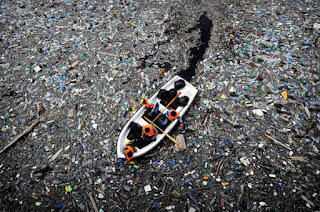3.2 Vulnerable Populations
We can not only focus on sedentary lifestyles and diets anymore when talking about the obesity epidemic. After learning further about the lack of chemical regulation and the new knowledge about chemicals and BPA exposures, we must demand policies be put in place immediately that protect us and make companies prove they are safe before they are sold anywhere in the U.S. Enough is enough. Our health, the health of our children, and even the health of the government officials' children are at risk without appropriate regulations.
I remember listening to Dr. Rishi Munchanda's presentation on NPR last year. He makes important points about not just treating the symptoms of a disease but looking at ways to decrease exposures to chemicals that contribute to diseases like migrane headaches and asthma. Health truly does begin where you live, work, and play. As the women in his story shed light on her living conditions, more began to be unraveled about the contributing factors of her ailment and her son's asthma. Her home was infested with mold, leaks, and roaches, her immediate home environment was the cause of her chronic allergies and headaches and were reduced y 90% after addressing her home concerns. Treating the allergies was not solely done with medication but with the help of a community health worker who made recommendations about how to improve her living conditions. This presentation shows us that public health concerns can not and will not be addressed only in the medical setting or only in the public health setting. Both public health and medical practitioners must work collaboratively to solve problems and advocate for policies that reduce exposures and improve the health of the community.
After watching the Reproductive Health and Environment video, reading the BPA articles and researching meat alternatives and tofu products I use on the EWG database I was shocked, dumbfounded, disillusioned and disappointed even more than I initially was when I first learned that many chemicals and products are unregulated by our federal government. I had no idea that 90% of our food that we buy is where we get the greatest BPA exposure from! 90% I looked at meat alternatives like tofu, Fieldroast sausages and Gardein chikin tenders only to learn that my least favorite meat substitute tofu is the safest to eat with a score of 1. While the Fieldroast sausages and Gardein chicken tenders are both a 4.5 making them moderately hazardous due to the manufacturing packaging practices by the companies. Food companies seemed like they put little to no effort to inform the consumers about the safety of the food and the food process. They include incomplete, inconsistent, disorganized information, on their sites and leave it to the consumer to jumble through that mess (Amarelo, 2016).
It is imperative that doctors, environmental scientist, public health professionals and the public work together to raise awareness, protest, and advocate for safer policies that put the consumer first and the companies last. How can it be possible that the European Union has policies in place for companies to prove their safety before going to market and the United States of America does not? Without these policies in place to protect us, we are left exposed to chemicals, toxic products, BPA filled food packaging. With exposures occurring at different times in our life, we are exposed from fetal development to death. There must be a shift in the burden of proof to companies. The fact that BPA is an estrogen mimicking hormone and has been linked to cause reproductive problems and cancer should be proof enough that food packaging cannot go unregulated. I know about the meat and dairy industries' practices which is why I am happy I have a plant based diet. However, I thought I was making a good choice choosing meat alternatives only to find out I have to worry about the packaging too!






Hi Mayra,
ReplyDeleteYes, it was really shocking to know that we get the greatest BPA exposure from the food that we buy. I thought by now that we should have more food products that are BPA free. I also wonder why the government are not putting stricter restrictions to food companies. I think health organizations and people in the communities should talk to their representatives/public government officials and show them studies that proves the health problem that people can get from BPA.
- Krissy
Hi Mayra,
ReplyDeletei was really surprised to learn that we are being exposed to BPA mostly through the food that we eat everyday. I think it does take time and research to make sure that the food we buy on the daily basis are BPA free because not all food labels necessarily tell you whether this product is free of BPA or not. The fact that even the packaging could contain BPA is worried some also because these companies are telling the truth when they promised that their food doesn't contain BPA but consumers don't really know if their container or package of the product is free of the chemical or not. There's no guarantee.
Hi Mayra,
ReplyDeleteI was also shocked to learn that we are exposed to BPA in the packaging of many different foods we buy. Ironically, many of these foods as you mentioned, are supposed to be healthy and vegan! As if it's not already hard enough to eat clean or vegan, BPA in packaging adds yet another layer of complexity to look out for as a consumer. I agree that companies need to take on the burden of proof to keep consumers safe.